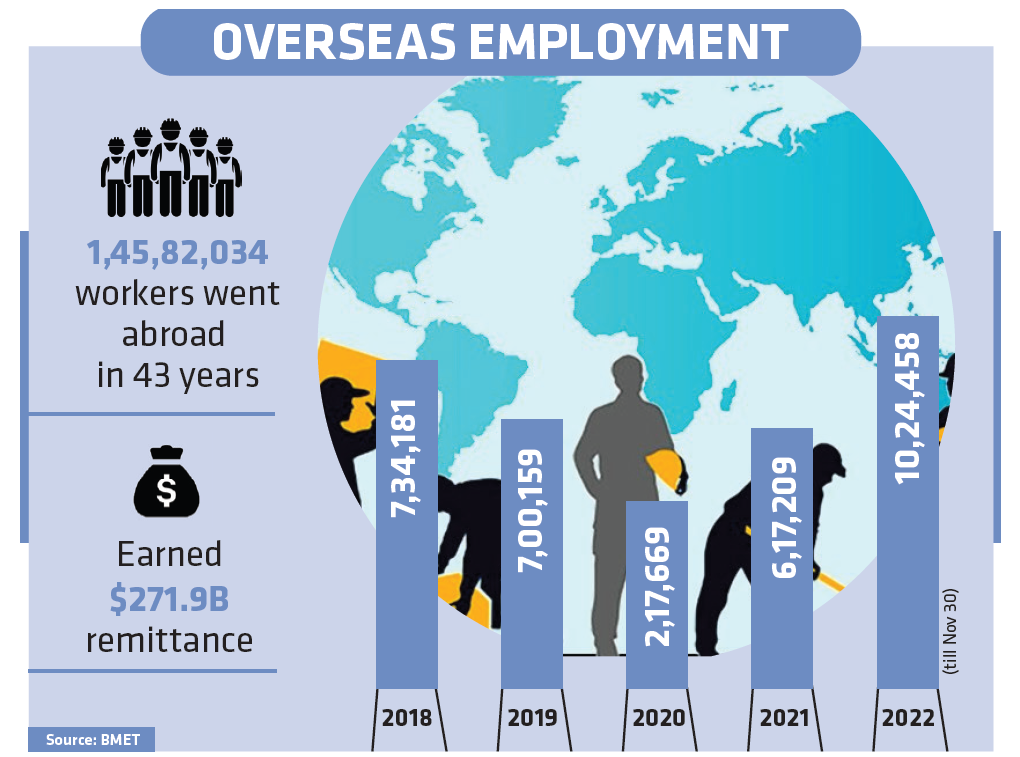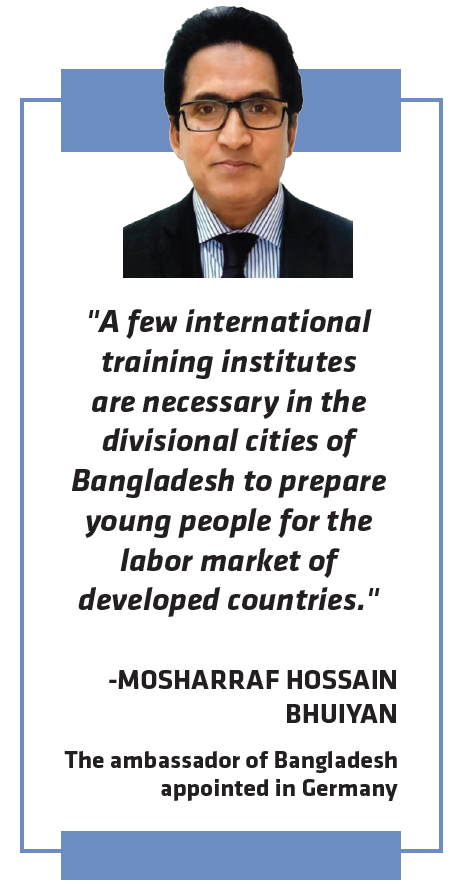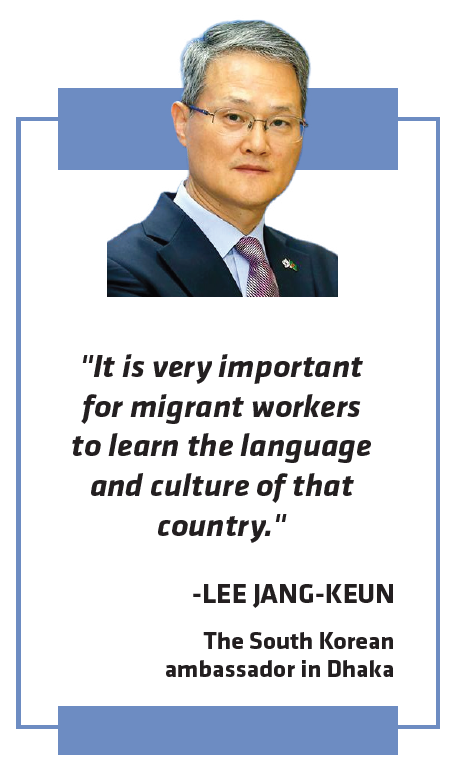Where there is a shortage of manpower in the developed world, there is an excess of it in Bangladesh. The demand for skilled manpower in the developed countries of Europe, America, Oceania and even Asia is at a peak now. Unfortunately, a large portion of Bangladesh’s manpower is unskilled and only Middle Eastern centric. However, opportunities are still open for Bangladesh to tap the untapped international manpower market and to ensure more remittances, writes MOHAMMAD RAFIUL HASSAN
It is indeed a true fact that most rich industrialized countries are grappling with the acute shortage of manpower to continue their economic activities. On the contrary, most underdeveloped or developing countries are struggling with a surplus of manpower to accommodate them in their economies. Here, the scenario seems to offer a nice solution for both the parties by exporting the excess workforce to the places in need of that, however, developing nation like Bangladesh is still lagging behind to grab that opportunity mainly due to its large portion of unskilled labour force.
YOU CAN ALSO READ: IS THE CURRENT ECONOMIC CRISIS WAR-DRIVEN MERELY?
Though the manpower export sector is the largest contributor with remittance to the country’s GDP after the apparel sector, the majority of unskilled labour force with a few work destination countries contributes to much less remittance relative to what it would have been if the workforce could meet the demand of the developed countries. Considering this, the country therefore requires to make its workforce efficient with specialized education and training and search for new manpower export markets especially in the Western countries where they are in shortage of skilled labour.
1. SKILLED LABOUR SHORTAGE – WHERE
USA: In the USA, company of every size and industry, across nearly every state are facing unprecedented challenges trying to find enough workers to fill open jobs. According to data from the Bureau of Labor Statistics, there are over 10 million jobs to fill but not enough workers to do so. If every unemployed person in the country found a job, it would still have 4 million open jobs. The transportation, IT, health care, social assistance, education, accommodation and food sectors have had the highest numbers of job openings.
CANADA: Canadian immigration news website CIC News reports that 9 million workers from the country’s baby boomer generation will reach retirement age this decade. Also, the country’s fertility rate fell to a record low in 2020, with an average fertility rate of 1.4 children per woman. According to the Labor Force Survey, there are currently around 1 million job vacancies in the country. Canada plans to invite 430,000 immigrants from outside the country as permanent residents in 2022 and more than 450,000 in 2024. Rajibul Rajib, who works at the Canada Revenue Agency in Richmond, Canada, said, “Canada is giving permanent residency to many skilled workers to sustain their economy. Most of these opportunities are being taken up by the people from China and India. Bangladesh should also use this opportunity.” According to the Labor Force Survey, the number of vacancies in the health care and social services sectors is growing rapidly in Canada.
AUSTRALIA: Australia plans to hire 1.2 million workers over four years to meet its labor shortage. The Australian government announced in September that it will increase its permanent immigration intake by 35,000 to 195,000 in the current fiscal year as the nation grapples with labor shortages. The increase could see many more nurses, engineers and agricultural workers join Australian economy, the country’s Home Affairs Minister Clare O’Neil said. Counselor (Labour) and First Secretary of Bangladesh Embassy in Australia, Salahuddin told the media, ‘We are aware of the manpower crisis in Australia. Bangladeshis who wish to take Permanent Residency (PR), they can apply through the existing system. If necessary, the embassy will provide all kinds of assistance.’
EUROPE: European countries like Finland, Greece, Malta and Italy have been experiencing labor shortages in various sectors. The government of Malta believes that the country’s economy needs foreign workers in the infrastructure, tourism, education and healthcare sectors. To meet the labor shortage, the European country Romania has announced to take one lakh manpower from Bangladesh. Greece has also expressed interest to take manpower from Bangladesh.
There is a shortage of workers in Britain and Germany too. Throughout the Europe, there is a demand for Doctors, IT specialists, nurses, plumbers and welders. Bangladeshi officials hope that this labor crisis in various European countries can open a door of opportunity for Bangladesh.
JAPAN: Japanese government officials told the local media that Japan is expected to have a shortage of more than 600,000 workers in the next fiscal year. According to the statistics given by the government, 50-60 thousand foreign workers will have opportunities in the nursing care sector alone among other industries. The second highest need of workers will be in the restaurant sector. 41 to 53 thousand workers will be required in this sector, 30-40 thousand in construction sector and 28-37 thousand in building cleaning companies. Japanese Ambassador to Dhaka Ito Naoki said, “There is a shortage of workers in some industries in Japan due to low birth rate and lack of skilled manpower. The Japanese government believes that it is necessary to ensure adequate human resources for future industrial growth.”
SOUTH KOREA: The Asian country requires high technology professionals along with semi-skilled and unskilled workers. In 2022, South Korea announced a quota of 1,941 Bangladeshi workers, but Bangladesh Overseas Employment and Services Ltd (BOESL) completed the quota within six months. South Korea announced again an additional quota in two phases. BOSEL expects that they can complete the quota within December this year. If everything goes according to the plan, the total number of workers employed will be the highest since the beginning of Korea’s Employment Permit System (EPS) program in Bangladesh since 2008. Additionally, there is a special demand for skilled professionals such as doctors, nurses, engineers, technicians in various countries of the Middle East where Bangladesh can take the opportunity to export manpower through skilled professionals.
2. CURRENT MANPOWER SITUATION IN BANGLADESH
The first manpower export in 1976 opened a new chapter for the country’s economic development. Since then, the main destinations of manpower exports from Bangladesh were the six Gulf Cooperation Council (GCC) countries namely Saudi Arabia, United Arab Emirates, Kuwait, Oman, Bahrain, and Qatar. Many other countries have been added in this list later but they were not significant. According to the World Bank report, more than one crore Bangladeshis are working in various professions in about 170 countries of the world, of which 75 percent work in the Middle East. More than 1 million workers go abroad legally every year. But sadly, only one-third of them are skilled workers.
The Bureau of Manpower, Employment and Training (BMET) recently conducted a study on manpower export potential in 53 countries. It says that the labor market has increased from 97 countries to 170 countries in the last decade but only a handful of workers in most of the countries. In fact, a new labor market has really not been created. For example, 2,232 workers from Bangladesh were sent to Japan from 1999 to 2021, which is only 0.02% of the total manpower exports.

3. CURRENT BARRIERS
Lack of proper education and training of our manpower is the biggest reason for sending unskilled workers abroad. These workers are mostly considered unfit for work due to poor communication and language inefficiency, behavioral problems, lack of physical fitness, vague understanding of modern machinery, lack of knowledge of migrant country laws, ignorance of hygiene and sanitation, which has reduced the quality of Bangladesh’s workforce in the international arena.
In order to go to many countries for work and educational reasons, it is necessary to be proficient in English. Sadly, many graduate students of our country do not acquire proficiency in the English language. Some countries require proficiency in another language in addition to English for employment. But very few educational institutions in our country have different language learning courses. As a result, many people miss out job opportunities in countries like Japan, Korea or China despite having sufficient qualifications.

4. HOW CAN WE OVERCOME
Experts and policy makers say that if international quality training institutes are established to train people in the major divisional cities of the country, Bangladesh will be able to gradually enter the labor market of the top 7 richest countries in the world. In this regard, the ambassador of Bangladesh appointed in Germany, Mosharraf Hossain Bhuiyan said, “A few international training institutes are necessary in the divisional cities of Bangladesh to prepare young people for the labor market of developed countries.” Germany’s population has been slowly declining in recent times. Because of this, skilled Bangladeshis are able to fulfill a certain part of labor needs in the European country’s labor market, said Mr. Bhuiyan. Lee Jang-keun, the South Korean ambassador in Dhaka, said “It is very important for migrant workers to learn the language and culture of that country.” Abida Islam, a former Bangladeshi ambassador posted to South Korea and currently posted to Mexico said, “Nepalese workers understand the language and culture of South Korea well. For this reason, their demand is high in South Korea. Bangladeshi workers can also increase their demand by being properly skilled in language and culture along with training in relevant sectors.”

The chairman of Dahmashi Group, Noman Chowdhury said, “The government should build several international training institutes in the divisional cities to make the youth skilled and trained for the labor market of developed countries. It is because the quality of institutions is very important in the context of labor exports when entering the labor market of a country.” He further said the population of Germany and Japan is decreasing. If the youth of our country can be properly trained in their respective sectors, Bangladesh can capture the labor market of those countries.
Experts believe remittances are one of the driving forces of Bangladesh’s economy. Therefore, the government should pay conscious attention to the manpower export sector and increase the investment in this sector. Sending skilled manpower, on the one hand, through officially legitimate means will increase the demand for Bangladeshi workers in the global market, on the other hand, increasing remittance flow will enrich the country’s economy in the long run.
5. GOVERNMENT’S INITIATIVES
The government is embarking on a special mission to explore the market for the export of manpower in developed countries. Ministry of Expatriates’ Welfare and Overseas Employment has appointed research institutes to study the labor market of 52 countries including 20 new countries. A separate ‘Labor Market Research Cell’ has also been established for labor market expansion.
Bangladesh Manpower Employment and Training Bureau (BMET) Director General Shahidul Alam said that workers are being trained through training institutes. Training is already going on in 70 centers of the country to make the workers efficient. There are 3 training centers in the capital alone. Efforts are being made to develop skilled workforce for higher income. With the initiatives that have been taken, Shahidul Alam said, the government expects a record number of workers to go abroad this year. It has already sent more than twice the target of workers abroad in the current year.
BMET Additional Director General Mir Khairul Alam said, “About three thousand Bangladeshi youth have been given necessary technical training including foreign languages.” Moreover, the government is looking at highly trained manpower to meet the needs of the industrialized market, he said.
It should be noted that Prime Minister Sheikh Hasina has consistently emphasized on exporting manpower to developed countries. She advised to define a practical course of action in this regard and the above initiatives have been taken in continuation of this.
Finally, it cannot be denied that our country has been blessed with huge workforce that many developed nations have not been so. The thing we need to be aware of is that the huge workforce is efficient enough to exploit the vast international manpower market.

To keep pace with rest of the world, we need to be prepared and be skilled for the fourth industrial revolution in which our massive workforce can be well fit to fill the vacant.
Emphasis should be placed on enhancing technological knowledge and technical skills. No doubt that the labour market of the Middle Easter countries is important for Bangladesh, but we must look ahead for better prospect in other regions too where numerous opportunities are inviting us. Government should take active initiatives to make the available human resources skilled according to the demands of international labour market. At the same time, missions in the foreign lands should also be active in solving any problems of the immigrant workers staying abroad. Only then may we expect to reap the benefit of the country’s enormous human resources in a very effective way.


